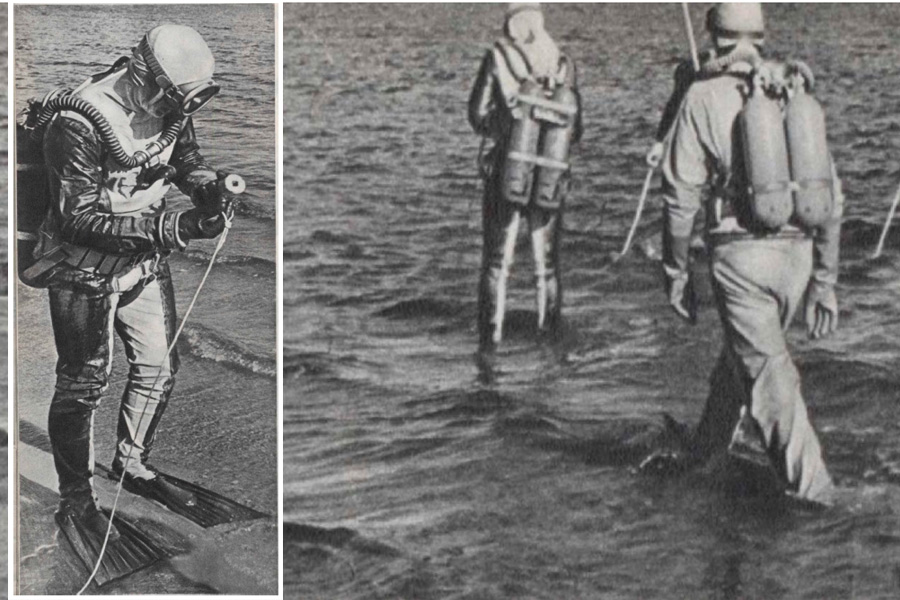Underwater sports club club "Amphibian" operated in Latvia from 1963 to 1985. (Information is being clarified)
Several dozen divers worked in the club, such as Eduards Smirnovs, DOSAAF Riga Seas club
underwater sports instructor Eduard Tkachenko, Bruno Pilot, Viktor Svirido, engineer Vladimir Stepanov, Gennady Opolchenny, engineer Yefim Goldberg, Nina Kolesnikova, Nadezhda Silyakova, Valya Danko.
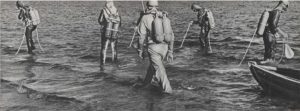
If you worked in Riga underwater sports club "Amphibija" or your friends, relatives, and you know the history of "Riga underwater sports club "Amphibija"", please contact us, phone 220-77-202, let's preserve the history of Latvian diving for future generations together!
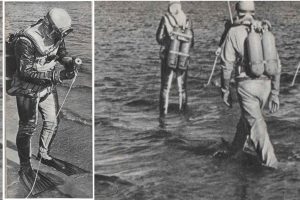
"Amphibian man" in full "battle" outfit... For Viktor Svirido from Vefi, scuba diving is a matter of his heart. Last summer, he emerged as one of the best underwater athletes of our republic.
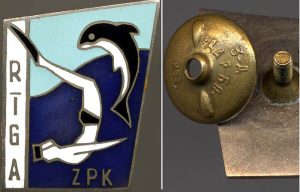
In 1963, together with scuba divers from Moscow, residents of Riga (Riga underwater sports club "Amphibija") inspected the underwater part of the docks of the sea port of Riga. Explosive craters of the German army were discovered, which could threaten the port structures. The Academy of Sciences also used the services of scuba divers, organizing an expedition in the Gulf of Riga. Their help was also needed by VEF water motor athletes.
Members of the "Amphibia" club - underwater athletes, underwater hunters, underwater photographers, film amateurs and
explorers are gearing up for the summer season. Two expeditions in the Gulf of Riga, as well as a trip with a self-built motorboat from the Baltic to the White Sea, promise much interest. This summer, hunting enthusiasts will be able to show their skill and dexterity for the first time in an official competition, while photographers will be preparing companies for a competition on the Kingdom of Neptune.
Table of Contents
In 1965, divers were looking for ligabaal in Kīsezer
On October 12, 1944, the landing party of the 374th Rifle Division of the 47th Army crossed Lake Ķīšezer and was the first to break into the capital of Soviet Latvia. During the battle, a projectile fired by the German army hit a raft. An anti-tank gun disappeared below them. Twenty years later, Riga scuba divers, Riga underwater sports club Amphibija found out about this event. And then the idea arose to find and lift the relic of the historical battle from the mud and hand it over to the city museum. Pictures from the scuba diver search in Keese Lake.
"Amphibia" was mentioned in the press of 1965 as a small-fish catcher
The inspectors of the Baltic Main Fish Protection Board, together with their public assistants, scuba divers of the Riga underwater sports club "Amphibija", inspected Gauja near Murjāņi over several kilometers. It turned out that the men of Neptune's kingdom had all the tricks and tips available. One by one, they arrived on the shore
carried out slaughterhouses of various types and sizes. Several of them had dead fish. You see, poachers don't always find their tools themselves. The inspectors took a whole load of cars from Murjānai to the scrap metal warehouse in Mangalia... Let the state farm "Gauja" poachers knows that their misdeeds can no longer be hidden. But if the people's controllers of the state farm will be more vigilant in protecting state property from being taken away, poachers the eel liked to sniff the wire mesh for his fishing gear. And then you won't have to hide and search for the "ends" of unemployment in the depths of Gauja.
Small-scale fishermen capture the scuba diver of "Amphibia" in 1965
There were three of them in the boat. Stealth iroll through the fines of the reeds, men investigated suitable, silent corner in Vecdaugava near Mangand began to act. Meter bymeter in the calm water guide kapron network. Thirty yearsri... fifty ... sevenmit… hundred… Malu fishermen acted quietly and cautiously, tachu their deeds did not stay aroundhidden. It happened that exactly at that moment it was to Vecdaugava our republics have also arrived underwater sports club "AmphibiaYes" members to a few hours from would spend their days off in underwater hunting. Isaw one of the underwater hunters, poachingyou got excited. They understood that their fishing gear is in danger. Underwater sportsmen's eye nets and not to hide the murders. The boat dropswent on the attack. One of the passengers secretly at moved towards the swimmer and, grabbing , pulled it under the water by the leg. With the next "sambo" grip poacher folded the athlete's emailpojamo tube. They walked in the thirdThe attack ended with a bangthis victory: the "enemy" was captured and dragged into a boat... Passengers who before departure the edge fishing was quite tightfaced with the fierce, led his ghūschute on the collective farm «9. May» zvethe boat pier in Vecāki. Recently there have been several per yearwhen the shore fishermen attackkushi for underwater hunters and for athletes. The guilty for their own prosecuted for the acts and punished. Every underwater sportsman should be an active fighter against the marginal fishermen who mercilessly plunder the riches of our waters.
In 1966, an "Amphibia" diver helped to recover unexploded German-era grenades
In the Auziņu lake near the former Lada octogenarian schools came out much more serious and dangerous a job. In the lake since the time of the war (World War II). German arms were lying in the gracame. I would probably sleep for a long time, but the local boys were the pafelt And in that case – one step to disaster. Scuba diver Bruno Pilot was one of the those who helped the army sapto deal with this shadow of war. Tagad Auziņi lake is not dangerous to no one.
Diving clubs in Latvia in the 20th century, 1900 - 1999
- Riga underwater sports club "Amphibija"
- Underwater Search Club “Aquilon"
- Diver Equipment Museum in Latvia
We invite donations of old diving photos and stories related to underwater work and sports
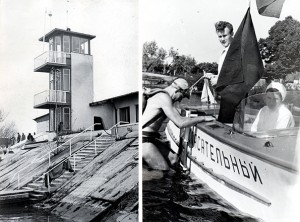
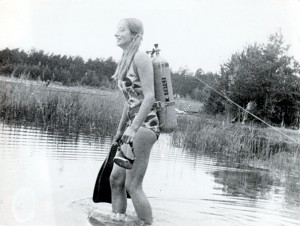
Underwater orienteering is one of the Soviet era Latvian underwater sports types. Scuba diving sports centers were in Riga, Jelgava, Kuldiga.
Please apply Latvian underwater athletes and scuba diving veterans, due to accumulation of historical memories!
We buy back used diving equipment for the diving club museum
- Equipment manufactured for underwater diving in the last 200 years is probably in working order
- Used diving equipment, suits, boots, gloves, vests, regulators, masks
- Repairable, timely diving equipment useful for diving training
Contacts
Call or WhatsApp 220-77-202 (Walter) or send a message using the contact form.

